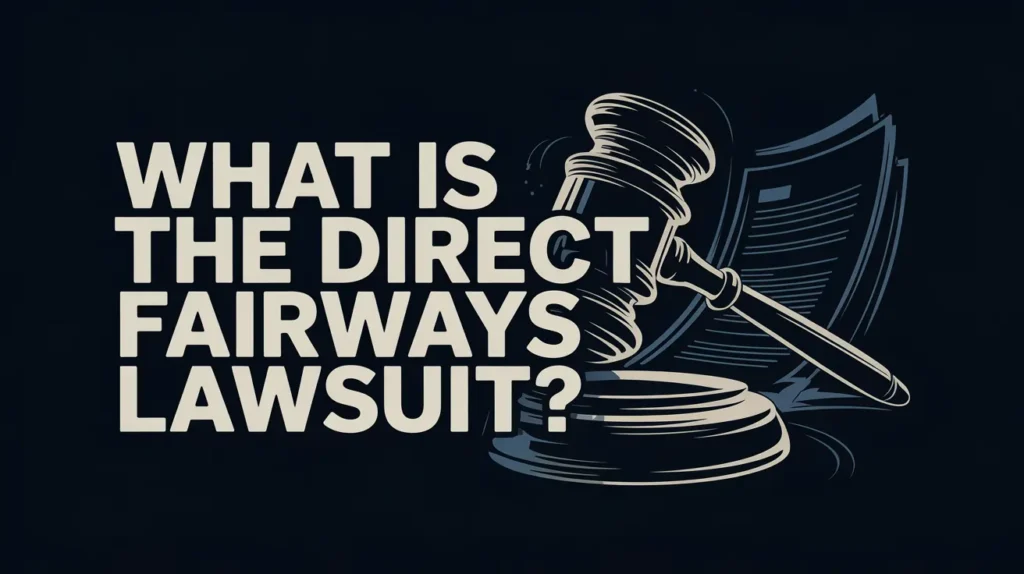Direct Fairways Lawsuit: Everything You Need to Know

Introduction to Direct Fairways and Its Background
Direct Fairways Lawsuit is a marketing company that primarily works with golf courses and businesses connected to the golfing community. The company gained recognition for helping local golf clubs, small businesses, and advertisers boost their visibility through printed course guides, online advertising, and promotional materials. At first glance, this seemed like a niche but profitable strategy—after all, golf attracts a wide range of businesses, from restaurants to real estate.
However, the company’s reputation started facing scrutiny when complaints began to surface regarding its sales practices. Allegations of aggressive telemarketing, misleading claims, and unfulfilled promises eventually drew public attention and even legal actions. This led to what is now commonly referred to as the Direct Fairways lawsuit, a legal battle that sparked widespread interest among both customers and small business owners.
Understanding the lawsuit requires a look at not just the company’s marketing model but also the issues that critics raised about their practices. It’s a classic example of how aggressive sales strategies, even if effective in the short term, can create long-term legal and reputational challenges.
What Triggered the Direct Fairways Lawsuit?

The primary reason the Direct Fairways lawsuit gained traction was due to a wave of complaints from businesses that felt they were misled or pressured into purchasing advertising services. Many small business owners claimed that the company’s representatives promised exposure and returns on investment that never materialized.
One of the main triggers was the telemarketing approach. Sales agents were said to use high-pressure tactics to close deals quickly, often leaving clients feeling trapped into paying for services they didn’t fully understand. In some cases, businesses alleged that they never authorized the charges that appeared on their accounts, leading to further disputes.
Another element that fueled the lawsuit was alleged misrepresentation. Critics accused the company of exaggerating its reach and effectiveness. While advertising in golf guides might sound appealing, the actual audience and circulation numbers didn’t always match the claims made by sales agents, according to reports. This disconnect between expectations and results became a cornerstone of the legal arguments against the company.
Legal Claims and Allegations Against Direct Fairways
The lawsuit against Direct Fairways centers on a few key legal issues:
- Deceptive Trade Practices: Plaintiffs claimed that the company misrepresented the benefits of its advertising services. If a business is sold on promises that aren’t delivered, this can fall under deceptive practices, which are heavily regulated in many states.
- Unauthorized Charges: Some clients alleged that Direct Fairways charged their accounts without explicit approval or continued billing them after they attempted to cancel services. Unauthorized transactions are not only unethical but also illegal Direct Fairways Lawsuit, which made this claim particularly serious.
- Breach of Contract: Businesses that signed agreements with the company felt that the terms of service were not honored. Whether it was related to ad placements, delivery of materials, or distribution numbers, many argued that the company failed to uphold its contractual obligations.
Together, these allegations painted a picture of a company that prioritized aggressive sales over customer satisfaction. Even though not all clients reported negative experiences, the sheer number of complaints was enough to put the company under legal and regulatory scrutiny.
The Court Proceedings and Outcomes So Far
When the lawsuit against Direct Fairways gained momentum Direct Fairways Lawsuit, it attracted media attention as well as interest from consumer protection agencies. Court documents and hearings highlighted the recurring complaints and provided a space for businesses to voice their concerns.
The proceedings focused on verifying whether the company’s practices fell under deceptive or fraudulent categories. Lawyers representing plaintiffs argued that Direct Fairways used misleading sales scripts, while the defense maintained that their advertising services were legitimate and that dissatisfied clients were a minority.
While the outcomes vary depending on jurisdiction and specific cases Direct Fairways Lawsuit, several settlements and agreements were reported. In some situations, Direct Fairways agreed to issue refunds or adjust their practices to avoid further penalties. However, the lawsuit also left a lasting dent in the company’s reputation, making future business development much more challenging.
Impact on Small Businesses and the Golf Industry
One of the biggest ripple effects of the Direct Fairways lawsuit was the impact on small businesses. Many of the company’s clients were mom-and-pop shops, local restaurants, and service providers that wanted to target golfers. When these businesses felt burned by false promises or poor returns, it left them with not only financial losses but also a lack of trust in Direct Fairways Lawsuit similar marketing offers.
For the golf industry, the lawsuit was equally significant. Golf clubs and associations often rely on sponsorships and advertising revenue to sustain their operations. Negative publicity surrounding a major player in this advertising niche made potential sponsors more cautious. Some golf courses even distanced themselves from companies like Direct Fairways to avoid being associated with controversy.
On the flip side, the situation also created opportunities for more transparent and ethical marketing agencies to step up. Businesses began looking for agencies that could prove results with measurable data, rather than relying solely on persuasive sales pitches.
Lessons Learned From the Direct Fairways Lawsuit
The Direct Fairways lawsuit serves as a case study for both companies and consumers. There are a few key lessons to take away from the controversy:
- Transparency Is Everything: Businesses offering marketing services must be upfront about what they can and cannot deliver. Direct Fairways Lawsuit Overpromising may secure short-term sales but will eventually lead to long-term fallout.
- Do Your Homework: Small businesses should always research companies before signing contracts. Reading reviews, checking with the Better Business Bureau, and seeking referrals can help avoid being misled.
- Legal Protections Matter: Consumer protection laws exist for a reason. The lawsuit highlights the importance of these regulations in holding companies accountable for their actions.
Ultimately, the case is less about one company and more about the broader need for honesty, accountability, and fairness in business practices.
The Future of Direct Fairways After the Lawsuit
For Direct Fairways, the road ahead is uncertain. While the company still exists, rebuilding trust after a lawsuit of this scale is no small feat. Rebranding efforts, improved customer service, and more transparent sales practices may help, but the shadow of past controversies lingers.
In the digital age, reputation travels fast. Negative reviews, lawsuits, and consumer watchdog reports remain accessible online for years. This means Direct Fairways will have to work much harder than before to prove its credibility to potential clients.
For the wider business community, the case underscores how quickly things can spiral when ethical lines are blurred. What starts as an aggressive marketing campaign can escalate into legal trouble if customer trust is compromised.
Conclusion
The Direct Fairways lawsuit is a clear example of how aggressive sales tactics and questionable business practices can backfire, leading to lawsuits, financial losses, and long-term reputational harm. While not every client may have had a negative experience, the volume of complaints was enough to draw legal attention and public scrutiny.
For businesses, the key takeaway is to always balance growth with integrity. For customers, it’s a reminder to remain cautious, ask questions, and thoroughly vet companies before signing contracts.
In the end, lawsuits like this don’t just affect one company—they send ripples across entire industries, forcing everyone to reflect on how they conduct business.



